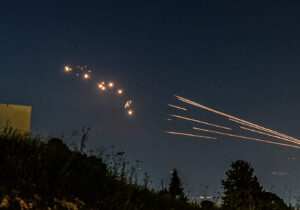For the first time since 2014, the Islamic State is losing ground. All summer the steady advance of Arab and Kurdish troops backed by international forces has weakened the IS command structure and sent it scrambling to defend its empire in Syria and Iraq. No doubt the timeless and ironic words of Ozymandias ring loudly in the ears of Abu Bakr al-Baghdadi.
The war is going well for now. But on the horizon lies the biggest challenge of all: the hulking brown metropolis of Mosul, its densely-packed streets teeming with over a million civilians and thousands of desperate jihadis ready to die for Allah. We know that Mosul must fall for IS to collapse; we also know that the battle for Mosul will be a bloody one.
Yet the greatest danger will come after Mosul falls. Rival Iraqi factions already wait in the wings to fill the void left by IS and occupy the rich hinterland that has been disputed by the Central Government and the Kurdistan Regional Government (KRG) for years. General David Petraeus forecasted the post-conflict situation in a recent op-ed in the Washington Post:
Leaders of the various Iraqi elements will likely have their own militias, and there will be endless rounds of brinkmanship on the road to post-Islamic State boundaries, governing structures and distribution of power and resources. If those challenges are not enough, others will emanate from Iran and the Shiite militias it supports, from Turkey and Iraq’s Sunni Arab neighbors, from the Kurdish Regional Government that understandably wants to retain the disputed internal boundary areas that its peshmerga now largely control[.]
Left unchecked, these factions will turn Mosul into ground zero for an even bloodier and more prolonged sectarian war that will annihilate Iraq as a functioning state. Millions of new refugees will be on the move, and Islamist movements will find many fresh recruits with an axe to grind.
The key to destroying IS, unifying Iraq, and preempting Iran is a well-supplied and well-planned action by the United States and its allies on behalf of the Iraqi government. Right now the United States looks timid, uncertain of its goals, and afraid to address sectarian problems with sectarian solutions. That must change.
Mosul provides an opportunity to get some things right. But to do that, the US must take seriously the following four recommendations:
1. Use requisite force.
The liberation of Mosul demands a far greater level of military commitment than the US is currently demonstrating. “U.S. forces today obviously lack the authority, remit and sheer numbers of the U.S. elements in Iraq in 2003,” notes Petraeus—and we all know how even those efforts fell short until the Surge of 2007.
Mosul is a hornet’s nest that isn’t conducive to light-footprint proxy combat like that used to topple the Taliban in 2001. If we learned anything from the past decade, it is that more troops usually lead to more victories—especially in high-stakes counterinsurgency scenarios like this one.
This does not mean reinvading Iraq. But the US needs to dramatically step up troop levels if it wants to pacify the hostile population inside Mosul and convince IS sympathizers that there is nowhere to hide. And if it also hopes to deter the creeping influence of Iran, the US needs to maintain those troop levels for years to come.
2. Focus on post-conflict governance.
Liberating territory from the Islamic State is one thing; planning for its future is something else entirely. Governance is the name of the game.
In his op-ed, Petraeus calls for the creation of a provincial council where competing communal interests can be represented and balanced. It is a good idea. Such a council can include a judicial body to adjudicate land claims and an economic committee tasked with promoting foreign investment.
But this is not enough to create a sustainable order. Part of Iraq’s instability stems from over-centralization of power in Baghdad and a belief by communities at the periphery that bureaucrats are, at best, inefficient and corrupt and, at worst, determined to undermine their group for their own sake.
What is needed is a serious attempt to implement the strong federal structure embedded in Iraq’s 2005 constitution. Stability can be fostered through geography by creating new and more homogeneous regions, provinces, and districts in order to give each group a sense of territorial empowerment.
Decentralization of power is, I believe, the key to relative stability in the Middle East. In the complicated demographic landscape of Northern Iraq, this logic holds no less.
3. Engage the Sunnis.
The atrocities of IS were committed by Sunni Arabs who were convinced that the new Shi’i government of Iraq was focused on disempowering and humiliating them. They saw IS as their defender. Defeating IS therefore requires convincing them that this simply isn’t the case.
“Nineveh’s Sunni Arabs,” Petraeus writes, “…will need considerable reassurances that their interests will be adequately represented in the new Mosul and Nineveh.” This means, for example, that “Shiite militias should play no role in post-Islamic State security and governance.”
Absolutely. But it also means that the US and its partners should demand a release of all KRG land claims on areas of the Nineveh Province that are currently occupied by Kurdish forces: Sinjar, the Nineveh Plain, and parts of Tal Afar. Financial compensation can make such a release palatable, and even desirable by the Kurds. What absolutely must not happen is an expansion of Shi’i and Kurdish interests at the expense of the Sunnis.
Meanwhile, devolution of power to uniquely Sunni prerogatives—territorial or otherwise—should be considered. As Petraeus writes:
Because Nineveh and the other Sunni Arab provinces lack significant energy resources and the leverage they provide, Kurdish-style constitutional autonomy is not a viable option. Nonetheless, Baghdad and Prime Minister Haider al-Abadi will need to be prepared to make more explicit commitments about levels of resourcing, and also perhaps grant the region greater autonomy in determining spending priorities.
Failure to get Sunni buy-in will doom any post-conflict order in Iraq before it is established. It therefore behooves Iraq, the US, and their allies to spend some time getting them onboard.
4. Protect and empower the minorities.
Iraq’s indigenous minorities have suffered genocide at the hands of IS. The repatriation, protection, and support of these minorities should be a top priority for all parties seeking to bring order and justice to areas liberated from IS control.
The best solution is to create a new self-administered province in minority areas north of the Tigris that will provide security and local self-governance for those seeking to return home and chart their own future within the Republic of Iraq. Such a province must be equipped with legal guarantees for right of return and preservation of indigenous culture and language. It must also receive special attention for economic aid and development from the international community.
Creation of a minority province will provide a stronger constitutional basis for these communities to participate in national politics. Greater minority participation, in turn, will help ease sectarian tensions across the board. Bringing a sizable non-Arab, non-Sunni bloc into parliament will diversify political voices, break stalemates, and set up opportunities for mediating between opposing viewpoints.
Mesopotamia has always been a cosmopolitan civilization, and there is no reason to think that it cannot be so again. Until now there hasn’t been a serious effort to engage Iraq’s many unique communities as communities and arrange a space for each in the halls of power.
The liberation of Mosul provides a rare chance to do this. Rather than proceed timidly, we must act boldly. Perfect peace remains elusive, but incremental improvement of the situation is certainly not out of reach.
—
Robert Nicholson is the executive director of The Philos Project, a nonprofit organization that seeks to promote positive Christian engagement in the Middle East. He holds a BA in Hebrew Studies from Binghamton University, and a JD and MA (Middle Eastern History) from Syracuse University. A formerly enlisted Marine and a 2012- 2013 Tikvah Fellow, Robert lives in New York City with his wife and two children.
Photo Credit: Peshmerga soldiers prepare for an anticipated attack along simulated front lines during training at the Manila Training Center in northern Iraq on July 26, 2016. The training marked the completion of the eight-week modern brigade course conducted by the coalition-led Kurdistan Training Coordination Center, a key piece of Combined Joint Task Force Operation Inherent Resolve’s multinational effort to train Iraqi security forces personnel to defeat the Islamic State of Iraq and the Levant. U.S. Army Photo by Maj. Allen Hill.






